Trade Schools, Colleges and Universities
Join Over 1.5 Million People We've Introduced to Awesome Schools Since 2001
Trade Schools Home > Programs > Trades > Marine & Watercraft Schools

Marine Mechanic Schools
Last Updated May 20, 2022
Marine mechanic schools offer training options designed to help you navigate toward a better life .
Does your ideal career involve spending a lot of time outdoors and working with all types of watercraft? A boat mechanic school can help you achieve that ideal. And right now could be an opportune time to enter this field. More than 87 million U.S. residents take part in recreational boating each year, and that number represents part of an overall rising trend. This growing interest in boating has resulted in increased demand for professionals who can build, maintain, and service boats.
So don't delay. Start the voyage toward a brighter future by entering your zip code into the search box below to find marine mechanic schools that offer programs near you!
8 Career Options for People Who Attend Marine Mechanic Schools
Sponsored Listings

J-Tech Institute
- Jacksonville, Florida
- Marine and RV Technology

Marine Mechanics Institute
- Orlando, Florida
- Marine Mechanic Training

According to 2021 data from the Occupational Employment and Wage Statistics program, the median marine mechanic salary was $46,730.* Plus, employment projections from the Bureau of Labor Statistics show that, on average, about 3,000 job openings are projected to become available each year in this trade from 2021 to 2031.* But these numbers are only based on mechanic positions. The reality is that completing a program at a marine mechanic school can help you qualify for multiple career paths.
Boat- and marine-related positions can be found with cruise lines, boat dealerships, outdoor department stores, marinas, watercraft manufacturers, and even the Navy and Marine Corps. You could uncover possibilities that never crossed your mind before now. So check out these eight job options that you may be able to pursue after attending a boat mechanic school:
1. Boat Rigger
Boat riggers take care of several tasks related to getting recreational and commercial boats ready for the water. They equip boats with important systems related to comfort, operations, and safety. In fact, their responsibilities often include installing propulsion systems, standing rigging, winches, anchors, bunks, furniture, lifeboats, and steering and throttle controls.
2. Dealership Technician
Dealership technicians are marine mechanics that work for a specific boat manufacturer or group of manufacturers. Many of these companies require certifications related to their product lines, and some marine mechanic programs include manufacturer-specific training to help you get started. So once you complete your schooling, you could choose to become a Certified or Master Technician with Mercury Marine, a Certified Master Technician with Yamaha Outboard, or a Certified Master Tech with Honda. You could also obtain several other manufacturer certifications with companies like Suzuki and Volvo Penta to help enhance your job prospects.
3. Gelcoat and Fiberglass Technician
Rather than focusing on mechanical aspects, you could begin a career in which you assess damage to a boat's gelcoat and fiberglass and then make repairs accordingly. Whether the boat is cracked, dented, gouged, scratched, or has structural damage, you can be responsible for restoring and maintaining its physical appeal, safety, and value.
4. Marina Service Manager
Many marinas offer repair services that could enable you to start out as a service technician and then work your way up to marina service manager. You would oversee the service team and may even be responsible for the yard crew that handles refueling and moorage services. Your daily tasks could include scheduling, creating work orders, billing customers, and managing inventory.
5. Marine Electrician
Marine electricians install, troubleshoot, and repair marine electronic and electrical systems, which could require working with blueprints and manuals or even drawing your own system diagrams. Some of the components that you may work with include batteries, chargers, solar panels, navigation systems, and satellite TV hardware.
If you opt for this career path, then you may want to consider obtaining additional industry certifications that many employers value. Options include Marine Electrical Certification through the American Boat and Yacht Council (ABYC) as well as Basic Marine Electronics Installer (MEI), Certified Marine Electronics Technician (CMET), or Advanced Marine Electronics Installer (AMEI) certifications through the National Marine Electronics Association (NMEA).
6. Marine Parts or Sales Associate

7. Marine Refrigeration and Air Conditioning Technician
Marine refrigeration and air conditioning technicians are sometimes referred to as mechanical systems technicians or marine HVAC service technicians. They rebuild and repair domestic and commercial refrigeration and air conditioning equipment, as well as hood and ventilation systems. They could also be responsible for maintenance services such as checking bearings, cycling, oil levels, and other components to ensure that units run properly. Some marine mechanics considering this career path opt to expand their expertise by training at an HVAC trade school .
8. Rig Shop Manager
Becoming a rig shop manager is something that you could work toward as a boat rigger. Once you build your experience, you may be able to take on a management position in which you could be responsible for overseeing rigging sales, customer service, training, and scheduling as well as creating and assigning work orders. You would likely work with rigging diagrams and measurements on a regular basis and may get to assist in the shop or out in the field with installations and repairs.
Begin the Voyage Toward a Successful Future
Take action today that could help you achieve career success sooner than you may have expected. Start out by entering your zip code into the search tool below to see which marine mechanic schools are offering programs near you!
* Unless otherwise noted, salary information is based on May 2021 data from the Occupational Employment and Wage Statistics (OEWS) program. Job growth and average yearly openings estimates are from the Bureau of Labor Statistics and are for the 2021 to 2031 period.

- Back to Degree Programs and Certificates
Marine Repair Technician
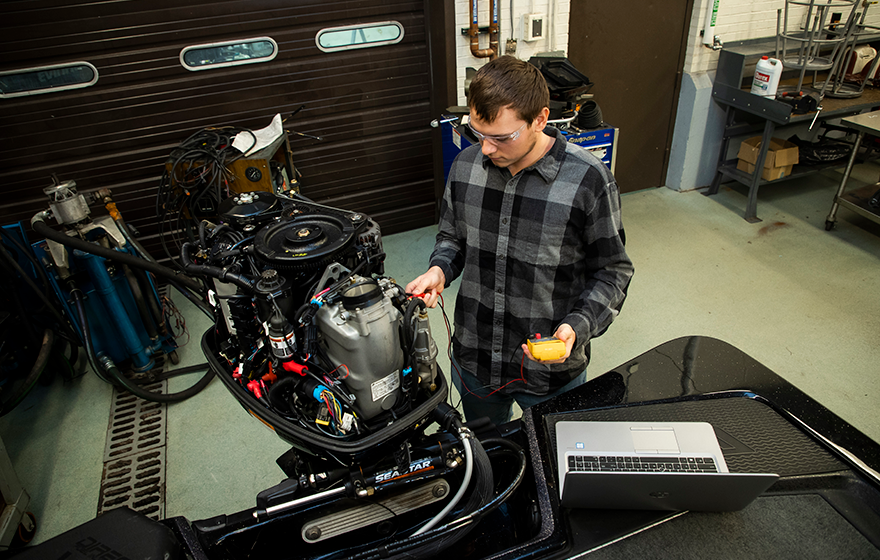
Get the Northwood Tech experience
Attend an event or schedule a campus tour/program shadow.
Visit Campus
Download the Catalog
Learn more about programs, courses, tuition and fees, services and more.
Download the 23-24 Catalog
Download the 22-23 Catalog
Finding the class you want to take has never been easier.
Find a Class
This program will be modified for the 2024-2025 academic year pending WTCS approval. Please contact an Admissions Advisor if interested or have questions.
The Marine Repair Technician program is a three-semester program to prepare you for a career in the marine service and repair business. Begin your training at a time that meets your needs. This program accepts new students in either the fall or spring. You can graduate with the tools and knowledge to begin your career repairing marine engines and boat systems for the recreational boating industry.
Program Overview
Students will be prepared for a career in the marina and marine service and repair business. This three-semester program includes instruction in marine engine service, service in marine propulsion systems, operation, diagnosis, repair, equipment installation, maintenance, and rigging new boats. Students will work on two-and four-cycle gasoline engines, drive systems, transmissions, electrical systems, and consumer-supplied products.
Program Outcomes
Marine Repair Technician graduates will be able to:
- Service marine engines
- Service marine propulsion systems
- Service diesel engines
- Demonstrate welding and metalworking skills
- Demonstrate industry-recognized safety practices
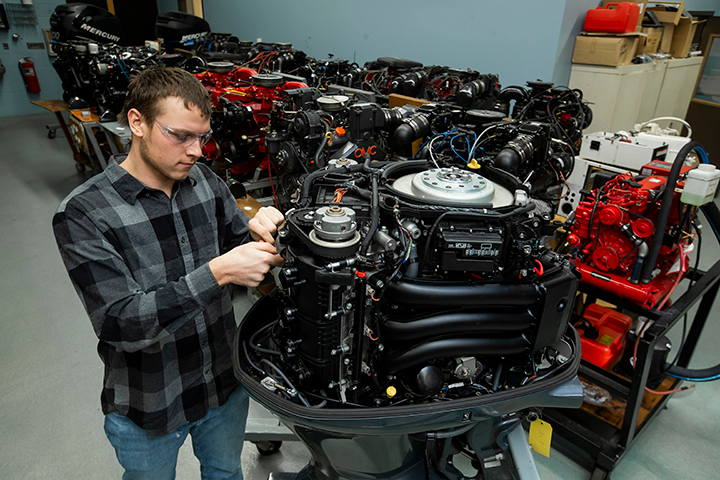
This is the program you’re looking at.
Continue your education to earn this technical certificate.
Advanced Marine Repair Technician
Continue your education to earn your bachelor's degree.
Transfer Center
Admissions and tuition.
Northwood Tech has an easy admission process that can be completed in one visit. Please see the details under the "Requirements and Application" section to get started.
Tuition and Fees
Northwood Tech breaks down the cost of education, so you'll have a good idea of how much your education will cost.
Financial Aid
Financial aid is available to help you pay for your education. It can come in the form of grants, loans, federal work-study, military and veterans benefits, division of vocational rehabilitation benefits, and scholarships.
Learn More About Paying for College
Estimated Total Program Costs 2023-24*
Marine Repair Technician
$4,350 for tools, supplies and uniforms
*Tuition is an estimate and does not include any miscellaneous fees for various courses, tools, books, supplies or uniforms. Program book costs are in addition to tuition and fees and vary depending on course selection and where the books are purchased or rented.
After the Northwood Tech Marine Repair Technician Program
Upon completion of the program, you will earn a Marine Repair Essentials certificate and a Marine Repair Technician technical diploma.

Take the Next Step
Are you ready to experience success? Northwood Tech staff are standing by to support you in reaching your educational and career goals, so do it. Take the leap.

Ready to join Northwood Tech's successful graduates? Easily apply today.
Apply for Free
Start here to begin your Northwood Tech journey. Learn about programs, admissions and more.
Request Information
Northwood Tech's admissions advisors are available to answer your questions.
Contact an Advisor

Service Locator
- Angler Endorsement
- Boat Towing Coverage
- Mechanical Breakdown
- Insurance Requirements in Mexico
- Agreed Hull Value
- Actual Cash Value
- Liability Only
- Insurance Payment Options
- Claims Information
- Towing Service Agreement
- Membership Plans
- Boat Show Tickets
- BoatUS Boats For Sale
- Membership Payment Options
- Consumer Affairs
- Boat Documentation Requirements
- Installation Instructions
- Shipping & Handling Information
- Contact Boat Lettering
- End User Agreement
- Frequently Asked Questions
- Vessel Documentation
- BoatUS Foundation
- Government Affairs
- Powercruisers
- Buying & Selling Advice
- Maintenance
- Tow Vehicles
- Make & Create
- Makeovers & Refitting
- Accessories
- Electronics
- Skills, Tips, Tools
- Spring Preparation
- Winterization
- Boaters’ Rights
- Environment & Clean Water
- Boat Safety
- Navigational Hazards
- Personal Safety
- Batteries & Onboard Power
- Motors, Engines, Propulsion
- Best Day on the Water
- Books & Movies
- Communication & Etiquette
- Contests & Sweepstakes
- Colleges & Tech Schools
- Food, Drink, Entertainment
- New To Boating
- Travel & Destinations
- Watersports
- Anchors & Anchoring
- Boat Handling
- ← Education
Guide To Marine Tech Schools And Colleges
Advertisement
There's a great blue hole in the marine industry's skilled labor force. The causes are complex, and easy solutions remain elusive.
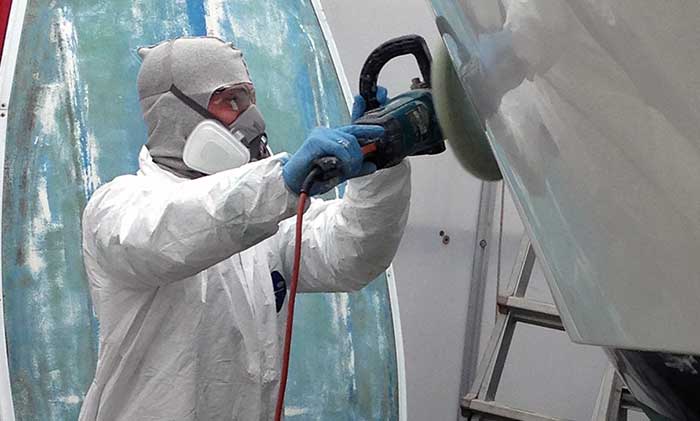
Students in the Rhode Island Marine Trades Association Pre-Apprenticeship Training Program get hands-on experience in a wide range of skills needed for jobs in the marine trades. The short-term program for Rhode Islanders has an over-90-percent job-placement rate. (Photo: RIMTA)
When was the last time you saw a kid changing his or her own car oil or spending hours messing around under the hood learning how engines work? It's a rare sight these days. Between modern high-tech engines and automobile manufacturers that discourage shade-tree tinkering, young people rarely have an opportunity to find out whether they have aptitude or interest in mechanics. This "skills gap" carries over into the boating industry, translating into a glut of available jobs — from manufacturing, to building, to engine mechanics — with no one to fill them.
Bridging The Technical Divide
"Manufacturers need to advertise this as a viable industry for a young person," says Marhevko, "and make it attractive by providing training."
One company doing just that is MarineMax, a national broker, lender, and marine-service company that has seen its employee base aging and shrinking and witnessed a large gap when it comes to hiring new skilled workers to fill those openings.
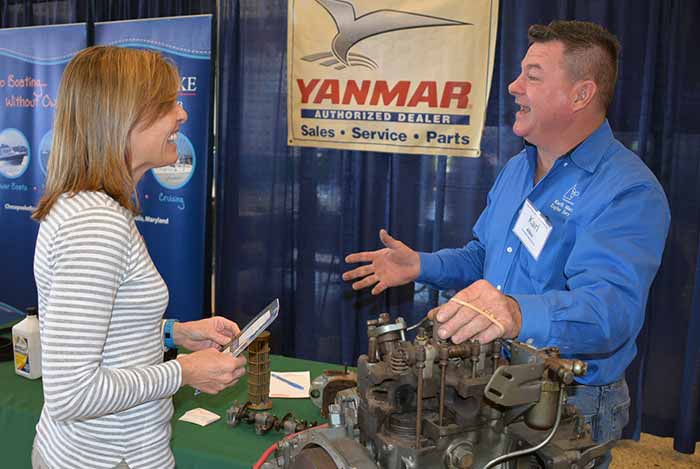
Photo: Pete Chambliss/EYCF
"Technical schools do a great job in the classroom," says Gayle Niedenfuer, MarineMax director of operations. "But candidates are coming into our dealerships trained in the basics, without the necessary real-world experience with different brands and different complex systems." So this past fall, MarineMax started a program to bridge the educational gap while building a talent pipeline. The MarineMax Technical Training Center in the company's Clearwater, Florida, store offers six months of classroom and hands-on training on a wide range of systems and brands. American Boat and Yacht Council (ABYC) and individual manufacturers are involved in the training. Students are considered employees from the time they start the program and, when finished, will go on to work in one of MarineMax's 70 stores around the U.S. and Puerto Rico.
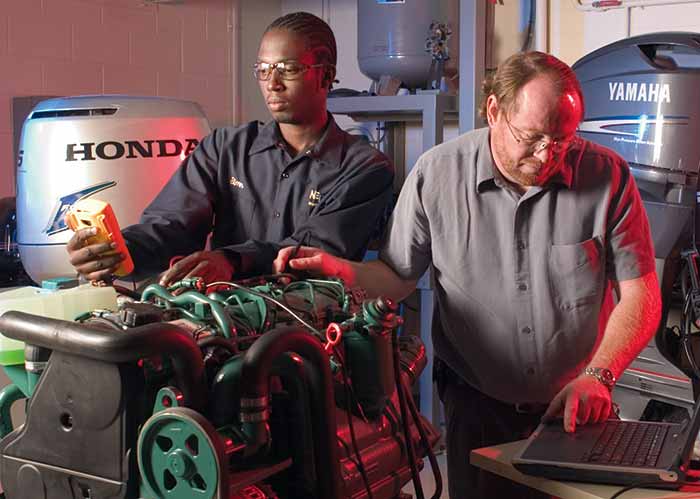
Photo: New England Institute
Also implementing real-world solutions is Randy Ramsey, president and founder of Jarrett Bay Boatworks, a custom sportfish builder in Beaufort, North Carolina, for the past 30 years and one of the largest repair yards in the Southeast. Jarrett Bay employs about 180 people, including machinists, electricians, plumbers, mechanical fitters, woodworkers, painters, and laminators. Ramsey confirms that his company's growth has been held back because of a lack of skilled people.
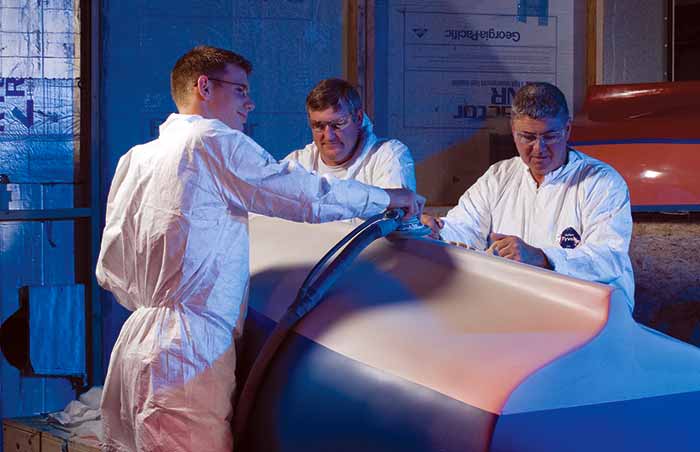
"It's easy to hire a marketing person," he says. "There are lots of people who've studied marketing. But they make less money than a skilled carpenter, because the carpenter is in demand. Same with engineers. It's easy to hire engineers. But hiring mechanics? That's a challenge." Ramsey points out that this issue has bigger implications than just employment: The lack of available workers affects boaters, too. "Either we have to turn away business, or customers have to look elsewhere due to long turnarounds."
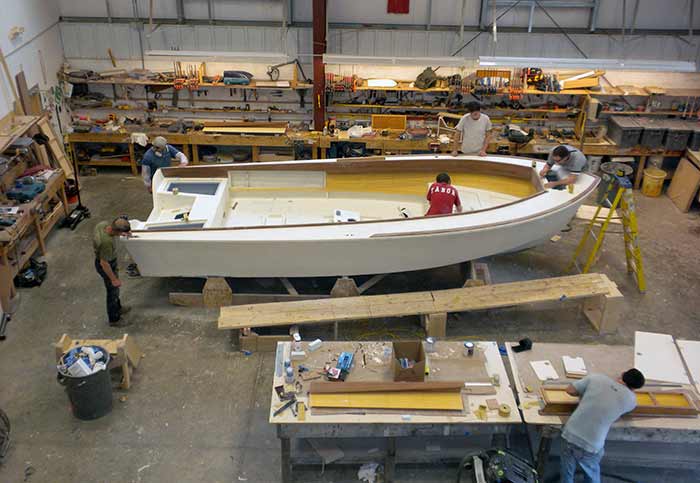
Photo: Tim Murphy
As a result, Ramsey and his team leaders find themselves offering summer internships to older high-school and college students and working with retired military, "who are highly sought after." Jarrett Bay Boatworks puts a huge investment into its employees, so moving them up from within and helping them excel is critical.
"One thing potential workers need to know is that while there are great jobs available, this is hard work. It's physically demanding. There's a certain mentality that's needed for these jobs. But once you get past that, the jobs are highly rewarding, both financially and from a career perspective."
Ramsey also points out the need for continual training and innovation. "If you're not improving in this business, you're falling behind."
Future College Students, Listen Up!
Employment in environmental and marine fields is expected to grow nearly 30 percent by 2018, according to a U.S. Department of Labor report. Driving this increase are coastal population growth, urbanization of the coast, and the need to maintain and expand working waterfronts. Opportunities will include environmental policymaking; regulations compliance; water-resource preservation; exotic/invasive pest control; and marine, ocean, and coastal conservation.
There are lots of other newer programs to consider. For instance:
- Marine Affairs/Marine Policy: While such programs have been traditionally reserved for advanced degrees, several schools now offer undergraduate programs. This interdisciplinary major marries social and natural sciences with statistics, economics, political ecology, computer programming, and more. Possible careers include policy-making on local, state, or federal government levels; non-government nonprofits; environmental protection; fisheries management; marine transportation; environmental consulting; marine insurance; shipping; and political ecology.
- Oceans/Coastal/Maritime Law: This concentration has grown significantly in the last decade due to the changing climate and water levels and to the many legal and policy changes regarding our oceans and waterways, coastlines, and water rights.
For more ideas for creative careers in the marine world, see the article " The Boat Lovers' Guide to Marine Colleges " by Tim Murphy.
Marine-Related Jobs Outlook
We drilled down on an array of marine careers to find out what they pay, academic credentials needed, and employment outlook. Here's an idea of how many jobs in each category were available in 2014, estimated growth through 2024, and median salary in 2015.
Opportunities Abound, And BoatUS Can Help
Building and fixing a boat today has become a much more technical enterprise than it was years ago — between CAD-CAM (computer-aided design, and computer-aided manufacturing), the use of space-age building materials and techniques, and all the sophisticated systems installed. The marine industry awaits more electronically and technically motivated young people to enter the field, get solid training, and become an important part of taking the industry to the next level.
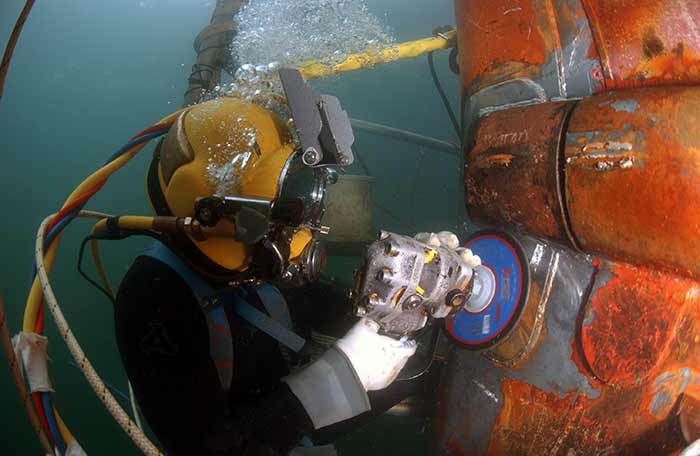
Photo: U.S. Navy/Andrew McKaskle
BoatUS Magazine has done some of the homework for students and second-career candidates interested in exploring marine-career options and the multitude of accredited certification programs, first-rate one- and two-year trade schools, and community colleges.Read our other in-depth article on this subject: " The Boat Lovers' Guide to Marine Trade Schools " by contributing editor Tim Murphy.
All Work And No Play? No Way!
Did you know that the student who loves the water and boats can bring those passions along, and go to a college with great sailing, fishing, and waterskiing clubs and teams? For instance:
- The top bass-fishing schools in the country are the University of Alabama; the University of North Alabama; and Murray State University, in Kentucky.
- The top-ranked sailing teams (for the 2015–2016 school year) are at Georgetown University, in Washington, D.C.; Connecticut's Yale University; and Boston College.
- The top-ranked waterskiing teams are at the University of Louisiana at Lafayette; Florida Southern College, in Lakeland; and the University of Louisiana at Monroe.
Sources: Collegiatebasschampionship.com , Collegesailing.org , USAWaterski.org
Related Articles
The truth about ceramic coatings for boats.
Our editor investigates the marketing claims of consumer-grade ceramic coatings.
Fine-Tune Your Side Scan Fishfinder
Take your side-scanning fishfinder off auto mode, and you’ll be spotting your prey from afar in no time
DIY Boat Foam Decking
Closed-cell foam flooring helps make boating more comfortable. Here’s how to install it on your vessel
Click to explore related articles
Stacey Nedrow-Wigmore
Managing Editor, BoatUS Magazine
Stacey is an award-winning marine journalist and photographer who, as BoatUS Magazine's managing editor, handles some of the national publication’s most complex features, as well as keeping it on time, accurate, clear, and timely. Stacey also manages the magazine’s active website and social-media engagement, and is part of the BoatUS video team, helping to produce more than 30 how-to videos a year. Stacey recalls that one of her earliest memories in life includes being hung by her ankles in the engine compartment of her family's 1963 Egg Harbor, helping with repair work and searching for lost items. Her love of boats may only be matched by her love of horses; she spent 20 years writing, editing, and photographing for equestrian magazines and books — including Practical Horseman
BoatUS Magazine Is A Benefit Of BoatUS Membership
Membership Benefits Include:
Subscription to the print version of BoatUS Magazine
4% back on purchases from West Marine stores or online at WestMarine.com
Discounts on fuel, transient slips, repairs and more at over 1,200 businesses
Deals on cruises, charters, car rentals, hotel stays and more…
All for only $25/year!
We use cookies to enhance your visit to our website and to improve your experience. By continuing to use our website, you’re agreeing to our cookie policy.

- Virtual Tour
- Request Info
Shortcuts for
- Prospective Students
- High School Students or Educators
- Alumni & Friends
- Areas of Study
- Degree Types
- View All Programs
- University Catalog
- Student Support & Resources
- College of Health Sciences
- Undergraduate Admissions
- Graduate Admissions
- Transfer Applicants
- International Admissions
- Tuition & Fees
- Financial Aid & Scholarships
- Accepted Students
- Early College Program
- About Our Campus
- Housing & Dining
- Student Health & Wellness
- Student Activities & Recreation
- Events Calendar
- Workforce Development
- Employer Resources
- News & Media
- Safety & Security
- Public Disclosure
- Commencement 2024
- COVID-19 Announcements
Home Academic Programs Associate Degrees Marine Technology, AS
- Marine Technology, AS
Program Mission, Goals, and Outcomes
Courses offered, q&a and technical standards, program overview.
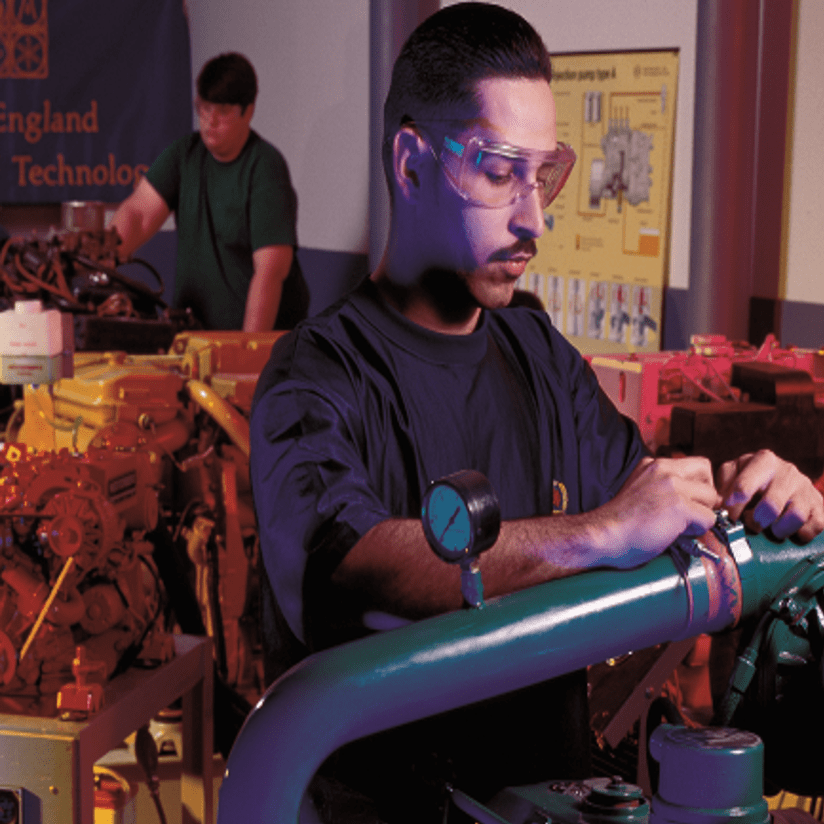
In the Associate in Science degree program in Marine Technology, you will develop hands-on skills in the installation, service, and repair of mechanical, electrical, electronic, and hydraulic systems used by both recreational and commercial boats and ships. The Marine Technology program will give you the opportunity to achieve factory technician certification in repairing Volvo Penta and Yamaha propulsion systems. This will prepare you for entry-level positions in boatyard operations, boat and shop manufacturing, engine repair, marine electronics installation, and more. Upon graduation, students become members in the American Boating and Yacht Council (ABYC).
Full Description
The Marine Technology program offers an associate degree in Marine Technology and Advanced Marine Technology and a Certificate in Marine Technology. Theory and practical training in boat and ship mechanics, marine focused business concepts, marine electrical, and marine systems installation, repair and service are the thrust of the program. Hands-on practical skills in installation, service, and repairs to mechanical, electrical, electronic, and hydraulic systems utilized by both recreational and commercial boats and shops are stressed throughout the curriculum to reinforce the in-depth theory classes. In addition, marine business procedures are taught using computerized learning methods with marine-specific software.
The Advanced Marine Technology degree program offers an additional term of study in some of the more advanced electronics and computer controls common in the industry today.
Graduates of the associate degree program are skilled boat technicians ready for entry-level positions in such areas as marina/boatyard operations, boat and shop manufacturing, marine engine repair, support services for commercial boats and shops, engine room staff aboard commercial vessels, marine electronics installation, and marine wholesale/retail product sales.
Graduates of this program are eligible to continue on for a Bachelor of Science Degree in Business Management to further their credentials.
Faculty members in Marine Technology are factory-certified by ABYC, Volvo, and Mercury Marine. The Marine Technology Department is the New England training site for Volvo Penta Marine with advanced training available for qualified students. Students completing the Marine Technology program may also qualify to become certified Volvo Penta Technicians.
ACCREDITATION STATUS
NEIT’s Associate in Science in Marine Technology program is an ABYC (American Boat and Yacht Council) Marine League of Schools member. The Marine League of Schools is comprised of post-secondary schools offering marine trade programs that provide ABYC standards-based educational programming. The Marine Technology program is conditionally accredited by the Marine Trades Accreditation Program , ABYC Foundation, 613 Third Street, Annapolis, MD 21146, 410-990-4460, ext. 200, [email protected] .
Potential Career Opportunities
The marine mechanic training will provide both the knowledge and skill needed to repair, maintain, and rebuild electrical systems, boat engines, motors, and other marine instruments.
Graduates of marine mechanic schools will find plenty of job openings in repair shops, though they may also find work on docks and marinas performing on-site overhauls for larger crafts like commercial fishing boats or private vessels.
The hands-on-experience provided by NEIT will also qualify individuals for careers in specialty positions across the boating and marine industry. Upon graduation, attainable marine service titles may include:
Marine Technician
Marine Systems Installer
Engine Builder
Franchise Dealership
The associate program in Marine Technology will take 18 months to complete. In addition to the hands-on-training provided at NEIT, graduates may be required to acquire additional certifications before they can begin work in the field.
The American Boat and Yacht Council (ABYC) is a recognized authority in the industry and offers certificate programs including specialty certification classes. Individuals must pass three out of the eight offered to become Master Marine Technicians.
Becoming a certified marine mechanic involves a few different steps. First, students must pursue an associate degree or equivalent. There, they will gain the skills needed to perform entry-level work. One to two years of on-the-job experience is recommended before pursuing certification.
After that window, individuals are encouraged to browse the programs offered by the ABYC. The organization offers certifications in subjects such as AC/Refrigeration, Diesel Engines, and Advanced Marine Electrical.
Certifications are valid for five years. After that, individuals must pass a recertification exam to maintain their status.
Job prospects for marine mechanics remain promising. According to the Bureau of Labor Statistics, motor vehicle dealers remain the number one source of employment for motorboat mechanics and marine service technicians. These positions may require specific training related to their product lines. The boat building and repair and maintenance industries are also major employers of individuals involved in the marine trades.
Related Programs
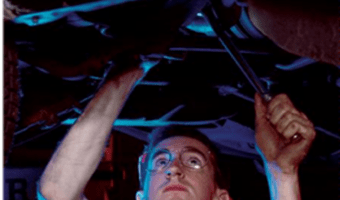
Automotive Technology, AS
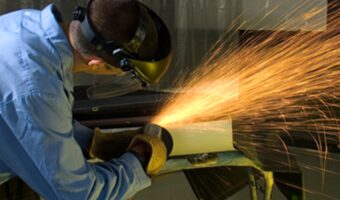
Automotive Collision Repair Technology, AS
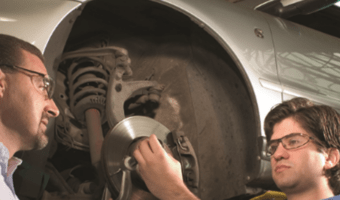
Automotive Technology with High Performance, AS
Program mission.
The mission of the Marine Technology program (MT) is to train entry-level technicians for employment in the marine field as well-rounded electrical and mechanical diagnostic technicians. Through the use of practical lab exercises and classroom experiences the student will gain knowledge in electrical theory, outboard engine repair, marine gas and diesel inboard repair, transmissions and navigation. Students will be well versed in ABYC standards through the use and reference to the standards manual throughout their program. Through participation in both lab and classroom experiences the successful student will gain the knowledge and experience necessary to be awarded an Associate in Science degree.
Program Goals
- The MT program will provide the students with the necessary experiences to become employed in a marine repair and/or manufacturing facility.
- The MT program will provide the students with an exposure to the ABYC standards employed in the field of marine vessel construction and repair.
- The MT program will strive to instill in the students a professional work ethic.
- The MT program will provide the students with the knowledge of workplace hazards and safe working practices to be used when working around the waterfront or in the presence of travel-lifts and other hoisting equipment.
Program Outcomes
Students successfully completing the Marine Technology program will be able to:
- Perform basic marine engine installation, diagnostics, tune ups, and repairs using the appropriate industry required service literature.
- Properly perform electrical installations, and troubleshoot, diagnose, and repair electrical devices according to ABYC standards and industry related service literature.
- Properly remove service, reinstall, align, and adjust marine drive systems and controls.
- Properly create repair estimates, repair orders, and marina service records required for the successful operation of a marine business.
- Demonstrate and understand environmental laws, Clean Marina protocols and EPA requirements associated with working in the marine industry for both fresh and salt water areas.
For the latest listing of courses offered, please review our University Catalog here .
Questions & Answers
- When do my classes meet? Day Classes: Technical classes normally meet for at least three hours a day for up to five days a week. Classes normally begin in the early morning (7:45 a.m.), late morning (usually 11:25 a.m.), or mid-afternoon. A technical time slot may vary from term to term.Evening Classes: Technical classes meet on the average of three nights a week, although there may be times when they will meet four nights a week. Classes normally begin at 5:45 p.m.In addition, to achieve your associate degree, you will take a total of approximately eight liberal arts courses, which will be scheduled around your technical schedule over the course of your entire program. Each liberal arts course meets approximately four hours per week. Liberal arts courses are offered days, evenings, and Saturdays.At the beginning of each term you will receive a detailed schedule giving the exact time and location of all your classes. The College requires that all students be prepared to take classes and receive services at any of NEIT’s locations where the appropriate classes and services are offered.When a regularly scheduled class falls on a day which is an NEIT observed holiday (Columbus Day, Veterans Day, Martin Luther King, Jr. Day, and Memorial Day), an alternate class will be scheduled as a make up for that class. The make-up class may fall on a Friday. It is the student’s responsibility to take note of when and where classes are offered.
- How large will my classes be? The average size for a class is about 20 to 25 students; however, larger and smaller classes occur from time to time.
- How much time will I spend in lab? Almost half of your technical courses consist of laboratory work. In order for you to get the most out of your laboratory experiences, you will first receive a thorough explanation of the theory behind your lab work.
- Where do my classes meet? Students should be prepared to attend classes at any of NEIT’s classroom facilities: either at the Post Road, Access Road, or East Greenwich campus.
- I have not earned my high school diploma or GED: can I enroll in an Associate Degree Program? A candidate for admission to an associate degree program must have a high school diploma, have earned a recognized equivalency diploma (GED), or meet the federal home school requirements.
- How long should it take me to complete my program? To complete your degree requirements in the shortest possible time, you should take the courses outlined in the prescribed curriculum. For a typical six-term curriculum, a student may complete the requirements in as little as 18 months.To complete all your degree requirements in the shortest time, you should take at least one liberal arts course each term. Students who need more time to complete their curriculum may postpone some of the liberal arts courses until after the completion of the technical requirements. Students are provided up to two additional terms of study to complete the liberal arts requirements without any additional tuition assessment fee. During these additional terms of study, students are required to pay all applicable fees.Students may also elect to complete some of their liberal arts requirements during Intersession, a five-week term scheduled between Spring and Summer Quarters. Students will not be assessed any additional tuition for liberal arts courses taken during the Intersession but may be assessed applicable fees.Students wishing to extend the number of terms needed to complete the required technical courses in their curriculum will be assessed additional tuition and fees.
- Is NEIT accredited? NEIT is accredited by the New England Commission of Higher Education. Accreditation by NECHE is recognized by the federal government and entitles NEIT to participate in federal financial aid programs. Some academic departments have specialized professional accreditations in addition to accreditation by NECHE. For more information on accreditation, see NEIT’s catalog.
- Can I transfer the credits that I earn at NEIT to another college? The transferability of a course is always up to the institution to which the student is transferring. Students interested in the transferability of their credits should contact the Office of Teaching and Learning for further information.
- Can I transfer credits earned at another college to NEIT? Transfer credit for appropriate courses taken at an accredited institution will be considered upon receipt of an official transcript for any program, biology, science, and mathematics courses in which the student has earned a “C” or above within the past three years and for English or humanities courses in which the student has earned a “C” or above within the last ten years. An official transcript from the other institution must be received before the end of the first week of the term for transfer credit to be granted for courses to be taken during that term. Students will receive a tuition reduction for the approved technical courses based on the program rate and will be applied against the final technical term of the curriculum’s tuition amount. No tuition credit is provided for courses which are not a part of the technical curriculum.
- What is the “Feinstein Enriching America” Program? New England Institute of Technology is the proud recipient of a grant from the Feinstein Foundation. To satisfy the terms of the grant, the College has developed a one-credit community enrichment course which includes hands-on community enrichment projects. The course can be taken for a few hours per term, spread over several terms. Students who are already engaged in community enrichment on their own may be able to count that service towards course credit.
- How many credits do I need to acquire my Financial Aid? In order to be eligible for the maximum financial aid award, you need to maintain at least 12 credits per academic term.
- What does my program cost? The cost of your program will be as outlined in your enrollment agreement, along with your cost for books and other course materials. Students who decide to take more terms than the enrollment agreement describes to complete the technical courses in their curriculum will be subject to additional fees and possible additional tuition costs. Students who elect to take the technical portion of the degree requirements at a rate faster than the rate prescribed in the curriculum and the enrollment agreement will be assessed additional tuition.Students who require prerequisite courses will incur additional tuition and fees above those outlined in their enrollment agreement.If a student elects to take a course(s) outside of the prescribed curriculum, additional tuition and fees will be assessed.Remember, students who withdraw and re-enter, one time only, pay the tuition rate that was in effect for them at the time of their last day of attendance for up to one year from their last day of attendance. Second re-entrees and beyond pay the tuition rate in effect at the time they re-enter. The most economical way for you to complete your college degree is to begin your program now and continue your studies straight through for the six terms necessary to complete your degree requirements.
- What kind of employment assistance does NEIT offer? The Career Services Office assists NEIT students and graduates in in all aspects of the job search, including resume writing, interviewing skills, and developing a job search strategy. Upon completion of their program, graduates may submit a resume to the Career Services Office to be circulated to employers for employment opportunities in their fields. Employers regularly contact us about our graduates. In addition, our Career Services Office contacts employers to develop job leads. A strong relationship with employers exists as a result of our training students to meet the needs of industry for over fifty years. No school can, and NEIT does not, guarantee to its graduates employment or a specific starting salary.
- Where will job opportunities exist? Graduates have obtained employment in the local area. However, one of the most exciting aspect of this program is the ability to look nationally for employment opportunities.
- What kind of jobs will I be qualified to look for? Generally, jobs will exist in the marine/repair service and sales aspect of Marine Industries. The U.S. Department of Labor Occupational Handbook predicts that job opportunities in the marine industry will grow at a faster than average rate with the greatest potential in the newer technologies such as marine electronics and electrical systems. Competition for jobs will be keen and requirements will increasingly emphasize and applicant’s training and education. The job best suited to you will depend upon your individual strengths and interests.
- Is there any state or federal licensing required in my field? No license is required for any of the careers which you will be preparing to enter. The Marine Technology program is not designed to prepare a student for a licensure exam.
- Will I be required to wear special clothing? Yes. Each student is required to purchase and wear uniform shirts. In addition, proper tan work pants must be worn (no jeans, sweatpants, nylon pants, shorts, tattered, too tight or oversized pants). Students must have purchased their uniforms and be wearing them to class and lab by the end of the third week of classes. Students who have not purchased their uniforms and/or who do not wear their uniforms will not be allowed to attend class after the third week of classes. Also, proper footwear such as good quality work boots are to be worn at all times. No sneakers, sandals or soft type footwear, shorts and tee shirts are allowed at any time.
- Will I be required to wear any special safety equipment? Yes, eye and ear protection must be worn when performing special tasks or in areas that require them. Students are responsible for the purchasing of proper eye protection and must be carried on them at all times. Eye protection must be worn at all times in the automotive labs. Ear protection is supplied by the College. Also, as a safety precaution, work shoes or boots must be properly laced and tied at all times, shirts must be worn tucked in pants, and no rings, watches, earrings, nose rings and or dangling jewelry is allowed during lab or shop conditions.
- Must I attend classes during the summer 5-week intersession? Students who wish to receive a Bachelor’s Degree in Business Management, without transfer credits from another college, may need to complete two of their core electives during the summer intersession.
Technical Standards
These technical standards set forth by the Automotive/Autobody and Marine Technology Departments, establish the essential qualities considered necessary for students admitted to these programs to achieve the knowledge, skills and competencies to enter these fields. The successful student must possess the following skills and abilities or be able to demonstrate that they can complete the requirements of the program with or without reasonable accommodation, using some other combination of skills and abilities.
Cognitive Ability
- Ability to obtain a score of 3 or higher on a ten point scale mechanical reasoning test.
- Ability to read and understand warning labels associated with various hazardous chemicals.
- Ability to learn, remember and recall detailed information and to use it for problem solving.
- Ability to deal with materials and problems such as organizing or reorganizing information.
- Ability to use abstractions in specific concrete situations.
- Ability to break information into its component parts.
- Ability to understand spatial relationships.
- Possession of basic math skills through addition, subtraction, multiplication and division of whole numbers and fractions using both the U.S. and Metric systems of measurement.
- Ability to perform tasks by observing demonstrations.
- Ability to perform tasks by following written instructions.
- Ability to perform tasks following verbal instructions.
- Possession of basic keyboarding skills and knowledge of computer programs.
Communications Skills
- Ability to communicate effectively with faculty and students.
- Ability to demonstrate and use the knowledge acquired during the classroom training process and in the lab setting.
Adaptive Ability
- Ability to maintain emotional stability and the maturity necessary to interact with other members of the faculty and students in a responsible manner.
Physical Ability
- An ability to work in a standing, sitting, squatting, kneeling, or lying position.
- An ability to lift, lower, push, and pull using both arms and legs.
- Ability to lift objects weighing up to 35 pounds.
- Ability to stand on a hard surface, usually concrete, for 4-6 hours at a time.
- Sufficient upper body strength to carry 20 pounds.
- Sufficient strength and agility to lift equipment and move large pieces of equipment independently.
- Sufficient strength and agility to grasp and maintain tension for long periods of time.
- Ability to wear and tolerate ear plugs, safety glasses and other protective equipment.
- Ability to perform learned skills, independently, with accuracy and completeness within reasonable time frames in accordance with procedures.
Manual Ability
- Ability to manipulate wrenches, screwdrivers, and other tools.
- Sufficient motor function and sensory abilities to participate effectively in the classroom laboratory.
- Sufficient manual dexterity and motor coordination to coordinate hands, eyes and fingers in the operation of tools and other equipment.
Sensory Ability
- Visual ability, with or without correction, to enable the student to differentiate automotive tools and instruments, wires, and components.
- Acute enough to read small print.
- Acute enough to read small numbers on precision measuring instruments.
- Acute enough to hear and understand words spoken by others in an environment with a high level of noise in the background (such as, but not limited to: airguns, engine

- Standards Library
- Standards Development
- Technical Toolkit
- Become a Member
- Member Benefits
- Member Toolkit
- Member Directory
- Online Learning
Certification Program
- Curriculum for Educators
- School Accreditation
- Events Calendar
- Rent Our Venue
- Scholarships
- Workforce Development
- Technical Board
- Media Resources
- 01 Online Learning
- 02 Certification Program
- 03 Curriculum for Educators
- 04 School Accreditation
ABYC Certification: A Benchmark in Marine Technical Education
When customers search for top-notch marine technicians, ABYC Certification stands out. Our nationally accredited program hones the skills of individual technicians and elevates the standard of businesses. Ensure your team remains updated and equipped to offer the best services.
ABYC Certification Highlights
- Nationally Accredited Program: Recognized as the benchmark in marine technical education.
- Broad Spectrum of Expertise: Certifications in Marine Systems, Marine Electrical, Diesel Engines, Advanced Marine Electrical, and more.
- Master Technician Credential: For those seeking the pinnacle of marine service excellence.
Join over 4,500 marine technicians who have stamped their commitment to safety with ABYC’s Certification.
For Businesses: Commit to Excellence
In the marine industry, the strength of your business is often measured by the skills of your technicians. Solidify your position as a trusted leader in boat service and repair.
- Demonstrated Commitment to Industry Standards
- Enhanced Credibility
- Strengthen Team Skills
- Increase Customer Loyalty
For Individuals: Your Journey to Marine Mastery
Stand Out with ABYC Certification. With ABYC, you’re not just getting a certification—you’re making a statement of dedication, quality, and trust in the marine world.
- Distinguish Yourself
- Continuous Learning
- Gain Industry Credibility
- Boost Your Career
Professional Certifications Include:
Marine standards, marine systems, marine corrosion, marine electrical, marine composites, a/c refrigeration, advanced marine electrical, marine engines and fuel systems, service management.
coming soon!
How to become ABYC Certified
Classes are taught by industry professionals/ABYC Certified Technicians and held around the world and online. ABYC Certifications are verified by the third party NOCTI Business Solutions, ensuring relevance and value. Exams are all multiple-choice questions measuring your knowledge in different areas. Upon passing, certifications are active for 5 years.
How to Earn a Professional Certification
- Take a Certification course – View calendar
- Self-study and test with a proctor – Learn more here
Recertification
To maintain your ABYC Professional Certification you must take the shorter recertification exam and fulfill a CEU requirement. Recertification is a simple process that re-establishes your educational standing in the industry.

On-site Courses
ABYC Business members can choose to host its own in-person or virtual class. Businesses can host the location and fill the course with their own attendees for a set price to ABYC, which includes the study guides, exams and a dedicated instructor.
Certification Designations
ABYC recognizes that many different types of marine industry professionals desire ABYC professional certifications, however not all of those individuals are physically working on boats. Many are in an advisory or consulting position and have a need for the same type of knowledge, but lack the practical skills that are necessary by service and installation technicians. ABYC has created certification designations to better associate the type of work being done by the individual.
Advisor Certification
Designed for people who work within the marine service sector that desire an ABYC certification but do not physically work on boats performing repairs.
Examples: Marine surveyors, customer service representatives and engineering standards compliance specialists.
- Requirements for initial certification: Passing score on certification exam
- Requirements for re-certification: Passing score on re-certification exam + 10 CEUs
- Certifications are valid for 5 years
Technician Certification
Technician certification is the means by which the ABYC and the general public identify those that are actually certified to perform trouble-shooting, repairs and equipment installations on boats.
Examples: Technicians, installers.
- Requirements for initial certification: Passing score on certification exam + 2 years of work experience.
NOCTI Collaboration: Third-Party Validation
Our collaboration with NOCTI underscores the authenticity and rigor of the ABYC Professional Certification Program. Renowned for its commitment to high-quality assessment and validation services, NOCTI’s third-party validation provides an added layer of credibility to our certifications, emphasizing the program’s alignment with the highest industry benchmarks.
Schedule Your Next Class
Become an ABYC Member
Tap into the essential source of technical information.

OUR COURSES
Stcw basic training.

MPT IS THE MOST COMPLETE FULL SERVICE PRIVATE MARITIME SCHOOL IN THE COUNTRY
Over the years, we have had the privilege of training thousands of commercial mariners , yachting professionals and enthusiasts. This has enabled us to develop programs that are success oriented , with unbeatable pass rates, as well as cost and time efficient.
LEARN MORE ABOUT OUR SCHOOL
Ready to start your career .

Why take STCW Basic Training

Hurricane Ian Update, Tuesday, September 27, 2022

Hurricane Ian update - Monday, September 26

Updating your US National Endorsement Master’s License for STCW Compliance
1915 south andrews avenue, fort lauderdale, fl 33316, +1-954-525-1014 | +1-888-839-5025 (toll free), site map | privacy notice | cookie policy | accessibility notice, 1915 south andrews avenue, fort lauderdale, fl 33316 +1-954-525-1014 +1-888-839-5025 (toll free).
- Request Information
- Support Students

- Visiting Campus
- Comprehensive Career Boat Building
- Marine Service Technology
- Career Technical Education – Small Engine Program
- Financial Aid
- For Students
- For Employers & Industry
- Disclosures

- Admissions & Aid
- Newsletter Signup
- Boats For Sale
- Captain’s Corner
- Like us on Facebook
- Follow Us on Instagram
- Make a Donation
- Boats for Sale
- Summer Workshops
- Blog & Social Media
Have a Question?
- Send an Email
- Give us a Call
Request an Information Packet

Program Objective
The Marine Service Technology (MST) Program is designed to prepare individuals who are well-rounded, entry-level marine technicians. Marine technicians work in settings such as marinas, marine dealerships, boat repair yards, marine manufacturing facilities, and yacht clubs. They perform installation and maintenance services on recreational and light commercial boats.
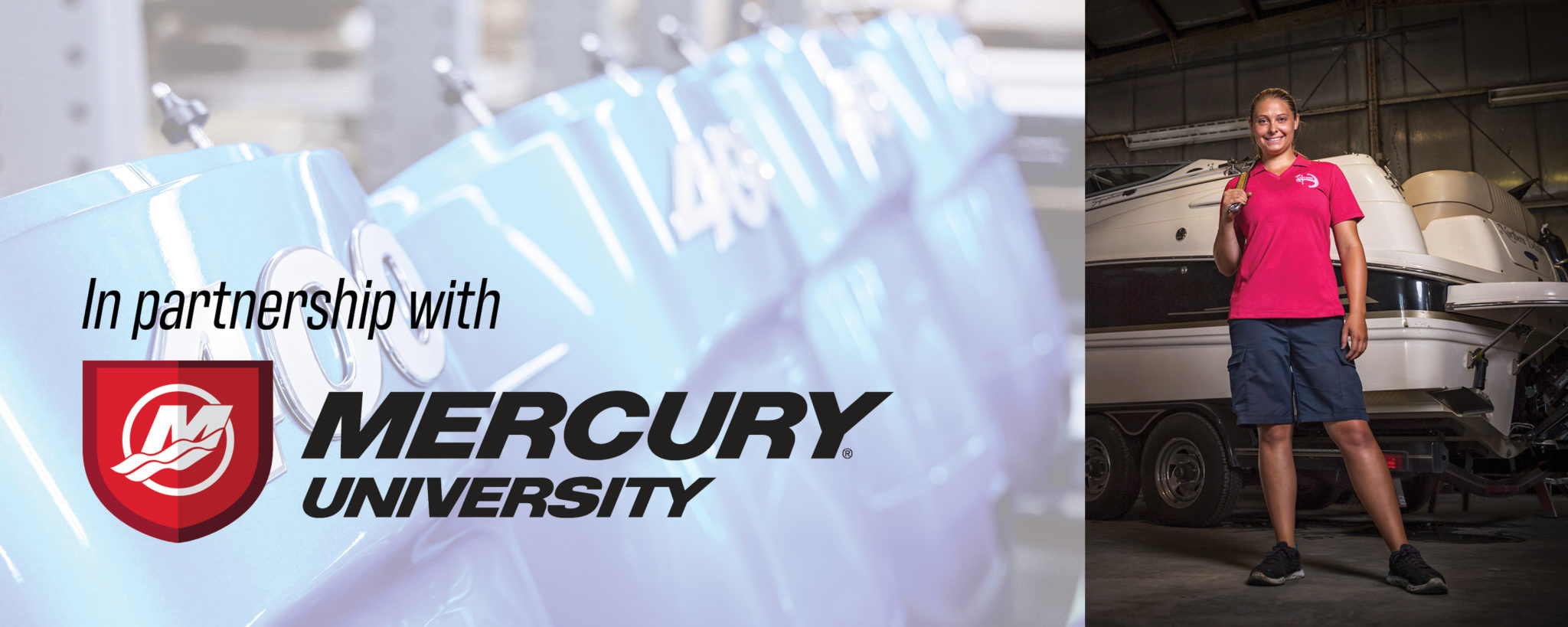
Program Description
The Marine Service Technology program requires 42 credits of coursework, including instruction in the classroom and in the shop, hands-on application in supervised lab time in the shop, and team and individual projects in the shop. The program is completed in three 15-week semesters in a 12-month period. Students complete a total of 1470 clock hours in instructional settings and outside preparation for instruction and projects over the course of the program. At the completion of the program, students will receive a certificate and will be eligible to test for ABYC certifications. The typical number of students in classroom or laboratory/shop settings of instruction is 15.

Enter The Workforce After 12 Months
Marine technicians (also known as marine mechanics) are experts in the maintenance and repair of the systems that keep the boats running. Rather than sitting at a desk all day, these technicians are constantly on their feet performing installation and maintenance services and working on new projects. From old fishing boats to a new shiny yacht, it is a marine technician’s job to make sure the boat operates properly.
Becoming a Marine Technician

Typical Work Environments Include:
- Boat dealerships
- Independent repair shops
- Outdoor department stores
- Yacht centers
- Cruise lines
- U.S. Navy and Marine Corps
Marine Technician Duties:
- Performing routine maintenance
- Keeping customers in the loop by communicating what needs to be done to get their boat up and running properly
- Observing and testing equipment on the boat
- Replacing and repairing worn, damaged, and defective pieces and parts
- Documenting repairs for the client
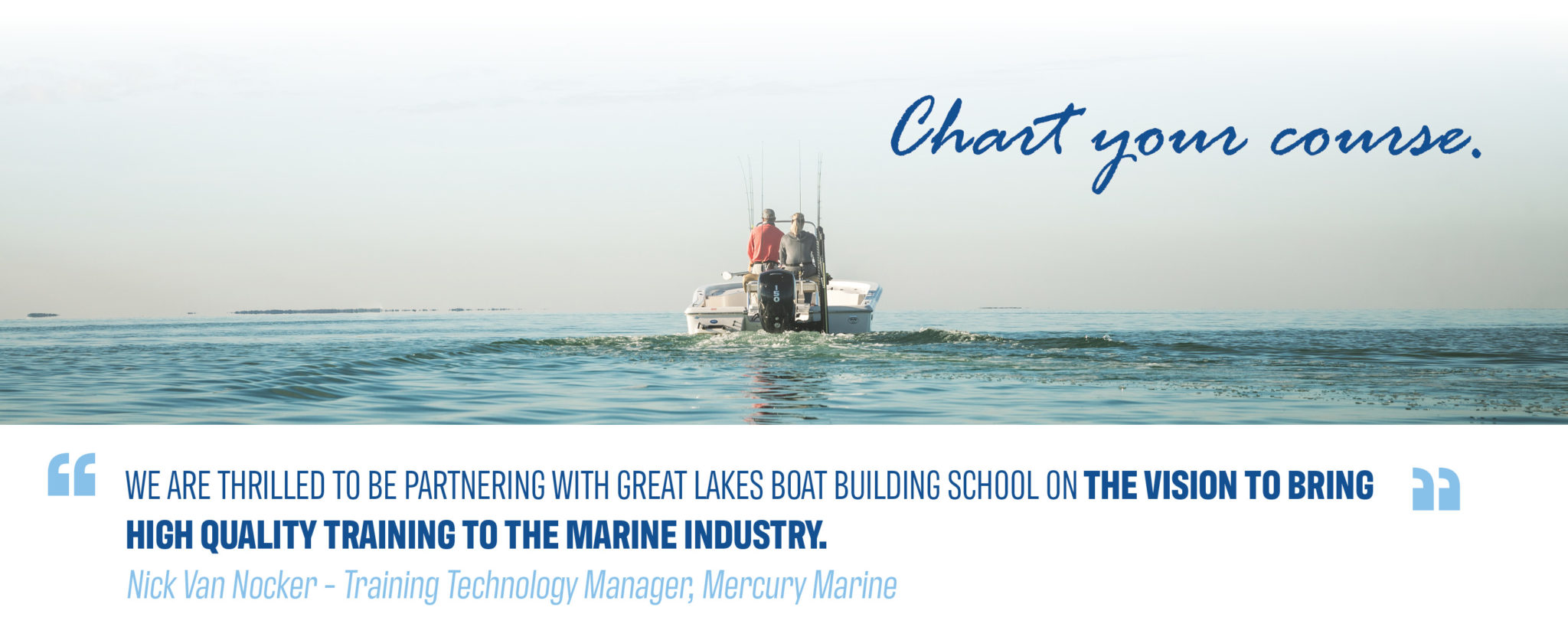
visit our school today
- Interested in a career in the marine trades industry? Please use this form to request information regarding our 12-month marine trades programs.
- First Name *
- Last Name *
- Hidden ST Alabama Alaska Arizona Arkansas California Colorado Connecticut Delaware District of Columbia Florida Georgia Hawaii Idaho Illinois Indiana Iowa Kansas Kentucky Louisiana Maine Maryland Massachusetts Michigan Minnesota Mississippi Missouri Montana Nebraska Nevada New Hampshire New Jersey New Mexico New York North Carolina North Dakota Ohio Oklahoma Oregon Pennsylvania Rhode Island South Carolina South Dakota Tennessee Texas Utah Vermont Virginia Washington West Virginia Wisconsin Wyoming Armed Forces Americas Armed Forces Europe Armed Forces Pacific
- What programs are you interested in? * Comprehensive Career Boat Building Marine Service Technology Both
- What year are you interested in starting at GLBBS? * 2024 2025 2026 undecided
Disclosure: By submitting this form, I agree that Great Lakes Boat Building School may call, text, and/or email me about their educational services at the contact information provided. I may unsubscribe at any time.
- Comments This field is for validation purposes and should be left unchanged.
Introduction to Marine Service Technology
Coursework in the first semester provides students with an introduction to the Marine Services Technology field, and basic skills and knowledge necessary for working with boats and in marine-related settings.
Credit hours: 14 Course completion: 15 Weeks

Marine Propulsion
In the second semester, students apply and further develop their knowledge and skills related to boatyard operations, and focus on the fundamentals of the wide range of propulsion and drive systems that are used in boats.
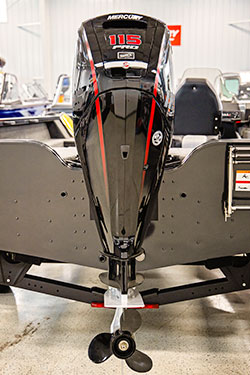
Marine Systems
The third semester coursework extends consideration of marine systems to non-engine systems including electrical, plumbing and climate control. Boatyard operations are also emphasized, as students apply knowledge and skills to the processes of winterizing and commissioning boats.
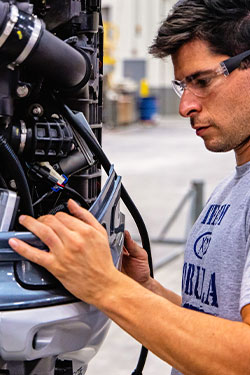
(906) 484-1081 485 South Meridian Road Cedarville, MI 49719
© 2019 Great Lakes Boat Building School. All Rights Reserved. | Privacy Policy Website by Central States Media
- Purchase GLBBS Apparel
- Skip to primary navigation
- Skip to main content
- Skip to footer

(866) 300-5984 [email protected]
Excellence in Maritime Training
First-class facilities. world-class instructors..
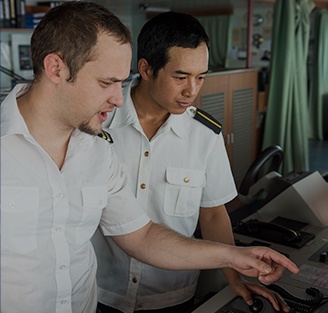
Professional Mariner
• Deck Courses • Engineering Courses View Professional Courses
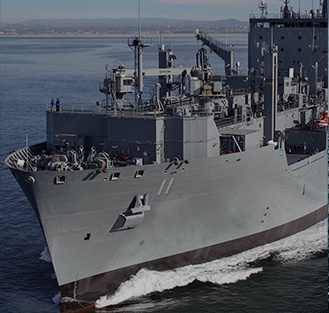
Government Vessels
View Government Vessel Courses

Recreational Mariner
View Recreational Courses

Wind Technician Training
Cutting edge, hands-on, maritime and GWO wind certification training.
View Courses
Embark on your maritime journey with confidence!
Our Everett, WA campus is now open!
Need help preparing and submitting your USCG paperwork?
Book a consulting appointment today!
View Services
Looking to get started in the maritime industry?
Join our Bootcamp program today!
More Information
TWO LEADING MARITIME TRAINING CENTERS HAVE MERGED!
The world of mariner training is continually evolving. We provide state-of-the art facilities with computer simulation equipment so you get real-world training in Norfolk, VA and San Diego, CA. Courses range from basic to advanced.
View Our Facilities
Introducing SeaLog™ Credential & Sea Time Tracking, supporting you, the professional mariner, wherever you go.
As a professional mariner, it’s important to stay on top of your credentials and time at sea. Now the maritime industry finally has a tool to do just that.
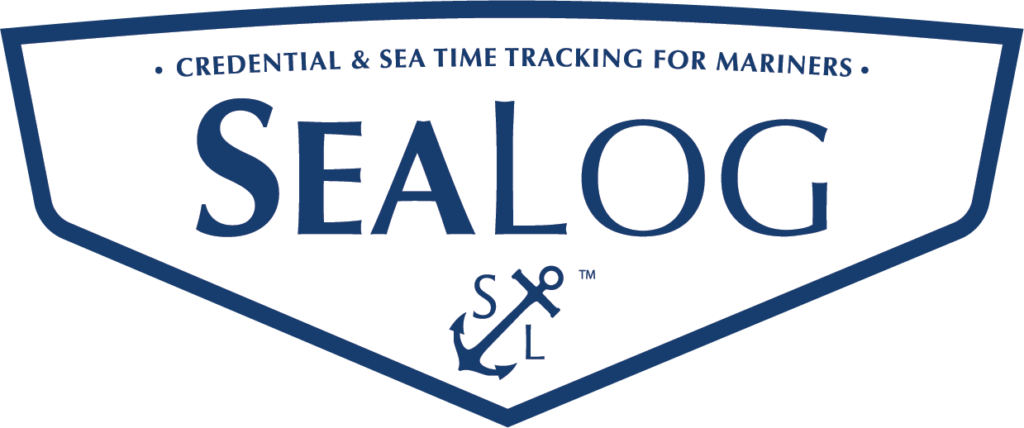
Earn Your Merchant Mariner Credentials Now
Our Boot Camp program is designed to produce fully credentialed and professionally trained mariners that are qualified to join any US Merchant Vessel at the entry level. These credentials, basic skills training, career skills training specific to the industry, and hands-on training opportunity, produce a strongly competitive candidate for employment.
Offered at our Norfolk, VA and San Diego, CA locations.
Whether you're just starting down the path of becoming a licensed captain, or an experienced professional wanting to upgrade or renew your license, we can help you get there. Our e-newsletter will keep you posted on the latest courses available to enhance your maritime career!
- Cookie Policy
- Privacy Policy
- Terms of Use
Sign Up For Our E-Newsletter!
Maritime Institute Online Course Portal Book Examination - Everett, WA Book Examination - San Diego, CA
Privacy Overview
Log in to maritime institute.
30 Best universities for Mechanical Engineering in Moscow, Russia
Updated: February 29, 2024
- Art & Design
- Computer Science
- Engineering
- Environmental Science
- Liberal Arts & Social Sciences
- Mathematics
Below is a list of best universities in Moscow ranked based on their research performance in Mechanical Engineering. A graph of 269K citations received by 45.8K academic papers made by 30 universities in Moscow was used to calculate publications' ratings, which then were adjusted for release dates and added to final scores.
We don't distinguish between undergraduate and graduate programs nor do we adjust for current majors offered. You can find information about granted degrees on a university page but always double-check with the university website.
1. Moscow State University
For Mechanical Engineering

2. Bauman Moscow State Technical University

3. National Research University Higher School of Economics

4. Moscow Aviation Institute

5. N.R.U. Moscow Power Engineering Institute

6. National Research Nuclear University MEPI

7. National University of Science and Technology "MISIS"

8. Moscow Institute of Physics and Technology

9. Moscow State Technological University "Stankin"

10. RUDN University

11. Moscow Polytech

12. Moscow State University of Railway Engineering

13. Finance Academy under the Government of the Russian Federation

14. Moscow Medical Academy

15. Russian State University of Oil and Gas
16. mendeleev university of chemical technology of russia.

17. Russian National Research Medical University

18. Plekhanov Russian University of Economics

19. National Research University of Electronic Technology

20. Moscow State Pedagogical University

21. Russian Presidential Academy of National Economy and Public Administration

22. State University of Management

23. Moscow State Institute of International Relations

24. Russian State Geological Prospecting University
25. russian state agricultural university.

26. New Economic School

27. Moscow State Technical University of Civil Aviation
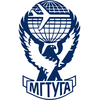
28. Russian State University for the Humanities

29. Russian State Social University

30. Moscow State Linguistic University

Universities for Mechanical Engineering near Moscow
Engineering subfields in moscow.

IMAGES
COMMENTS
According to 2021 data from the Occupational Employment and Wage Statistics program, the median marine mechanic salary was $46,730.*. Plus, employment projections from the Bureau of Labor Statistics show that, on average, about 3,000 job openings are projected to become available each year in this trade from 2021 to 2031.*.
The Marine Technician Specialist program is perfect for those who love the water and want to pursue a career in the marine industry. 1 Through a combination of classroom instruction and hands-on experience, students will learn everything from inboard gas and diesel to outboard 4-stroke and 2-stroke motors. 51-week core program 60-week program ...
9. The Landing School, Maine. The Landing School is one of the oldest marine mechanic schools in the country. It has received accreditation from The Accrediting Commission of Career Schools and Colleges (ACCSC) for its programs in yacht design, wooden boat building, composite boat building, and marine systems.
Marine Repair Technician. 42 Credits | 1.5 Years. $7,342. $4,350 for tools, supplies and uniforms. *Tuition is an estimate and does not include any miscellaneous fees for various courses, tools, books, supplies or uniforms. Program book costs are in addition to tuition and fees and vary depending on course selection and where the books are ...
The ABBRA report breaks wages down by marine-trade job and by region. To get an idea of the nationwide figures, an unskilled yard laborer in 2009 earned $16 per hour on average, with a range of $8 to $26. Mechanics earn an average hourly wage of $22; electronics technicians, $24; yard foremen, $24.75.
The top bass-fishing schools in the country are the University of Alabama; the University of North Alabama; and Murray State University, in Kentucky. The top-ranked sailing teams (for the 2015-2016 school year) are at Georgetown University, in Washington, D.C.; Connecticut's Yale University; and Boston College.
The marine mechanic training will provide both the knowledge and skill needed to repair, maintain, and rebuild electrical systems, boat engines, motors, and other marine instruments. Graduates of marine mechanic schools will find plenty of job openings in repair shops, though they may also find work on docks and marinas performing on-site ...
SMA offers about 45 courses annually. Seattle Maritime Academy offers formal certificate programs in both Marine Deck Technology and Marine Engineering Technology. In addition to the formal programs, SMA provides STCW Training in a variety of marine subjects and topics under the aegis of community education. Lastly, SMA provides training under ...
In the 51-week Marine Technician Specialist training program, you'll dive into key aspects of the marine industry. Students complete a series of five, three-week manufacturer-specific courses to learn the technology of top manufacturers, giving you a wide variety of skills you can take with you as you pursue a career in the field. Upon graduation, you earn a diploma and are prepared for a ...
I further understand and agree that I may instead call MIAT at 1-800-477-1310 for Canton, MI and 1-888-547-7047 for Houston, TX or UTI at 1-800-913-7524 to request admission information. I understand that if I do submit this form, I may unsubscribe within marketing emails or opt-out of text messages at any time by replying "STOP.".
The majority of schools offering instruction in the trade of boat and marine mechanics are independent, private, for-profit institutions. Some have multiple campuses, usually located near water. However, there are also a number of community colleges, technical schools and high schools that present training courses in boat engine technology.
Technician Certification. Technician certification is the means by which the ABYC and the general public identify those that are actually certified to perform trouble-shooting, repairs and equipment installations on boats. Examples: Technicians, installers. Requirements for initial certification: Passing score on certification exam + 2 years of ...
LEARN MORE ABOUT OUR SCHOOL. READY TO START. YOUR CAREER? CLICK HERE TO BEGIN. MPT NEWS. 24 May 2023. Why take STCW Basic Training. 27 Sep 2022. Hurricane Ian Update, Tuesday, September 27, 2022. 26 Sep 2022. Hurricane Ian update - Monday, September 26. 01 Sep 2021.
If you're interested in becoming a boat mechanic, consider the following steps: 1. Earn a degree. While a degree isn't a requirement, many employers prefer hiring a mechanic with formal education. Consider earning an associate degree in small engine technology or enrolling in a certificate program for marine technology.
The Marine Service Technology program requires 42 credits of coursework, including instruction in the classroom and in the shop, hands-on application in supervised lab time in the shop, and team and individual projects in the shop. The program is completed in three 15-week semesters in a 12-month period. Students complete a total of 1470 clock ...
The Landing School effectively prepares men and women for careers in the marine industry as practical designers, builders, and systems technicians who work professionally on today's vessels, adapt to the industry's evolving technology, and appreciate the traditions of the past while imagining and building the boats of the future.
Wind Technician Training. Maritime Institute is the leader in Maritime Training in the US. We offer over 150+ USCG-Approved courses in state-of-the-art facilities.
Enroll in our Marine Service Technologies program today. To get started with this program, sign up today to attend a program orientation by contacting the Admissions Counselor at: [email protected] or 754.321.5840. For additional information, please contact the Office of Admissions at (754) 321-5700.
The skills and experience gained at Marine Mechanics Institute can help prepare students for careers. Be proactive about your future and learn more today. Train with the latest in the industry as a marine mechanic at MMI and work on many brands, including Yamaha Marine. Find out more about this course now!
Below is a list of best universities in Russia ranked based on their research performance in Mechanical Engineering. A graph of 714K citations received by 136K academic papers made by 158 universities in Russia was used to calculate publications' ratings, which then were adjusted for release dates and added to final scores.
Moscow 30. Saint Petersburg 16. Tomsk 6. Below is the list of 30 best universities for Mechanical Engineering in Moscow, Russia ranked based on their research performance: a graph of 269K citations received by 45.8K academic papers made by these universities was used to calculate ratings and create the top.
Bachelors in Mechanical Engineering are interdisciplinary degrees that teach students how to design or improve mechanical and thermal devices and systems using analysis and computer-aided design. Engineering schools teach students how to find solutions to develop new processes and products, ranging from small component designs to extremely ...
06 Nov 2020 by Rosatom. TVEL Fuel Company of Rosatom has started gradual localization of rare-earth magnets manufacturing for wind power plants generators. The first sets of magnets have been manufactured and shipped to the customer. In total, the contract between Elemash Magnit LLC (an enterprise of TVEL Fuel Company of Rosatom in Elektrostal ...